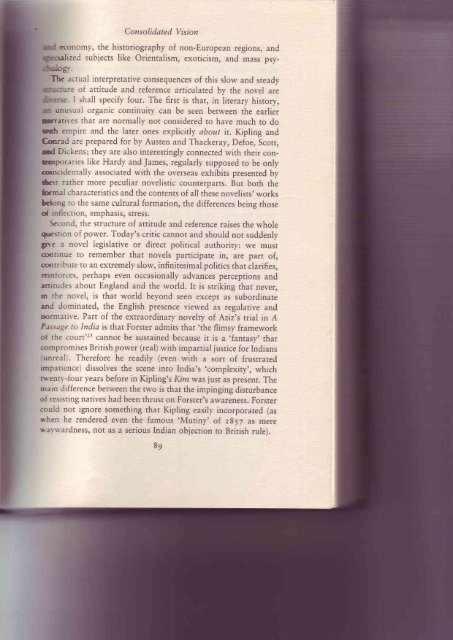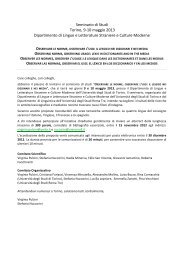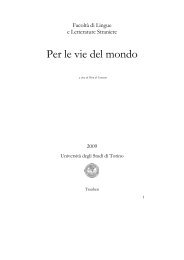Consolidated Vision
Consolidated Vision
Consolidated Vision
Create successful ePaper yourself
Turn your PDF publications into a flip-book with our unique Google optimized e-Paper software.
<strong>Consolidated</strong> <strong>Vision</strong><br />
cconomy, the historiography of non-European regions, and<br />
idized subjects like Orientalism, exoticism, and mass psy-<br />
Thc actual interpretative consequences of this slow and steady<br />
of attitude and reference articuiated by the novel are<br />
. I shall specify four. The first is that, in literary history,<br />
unusual organic continuity can be seen between the earlier<br />
rrarives that are normally not considered to have much to do<br />
-t empire and the later ones expliciúy about it. Kipling and<br />
Gúrad are prepared for by Austen and Thackeray, Defoe, Scotr,<br />
rd Dickens; they are also interestingly connecred with their con-<br />
F 'pnraries like Hardy and James, regularly supposed to be only<br />
oincidenrally associated with the overseas exhibits presented by<br />
Òcir rarher more peculiar novelistic counrerparts. But both the<br />
brmal characteristics and the contents of all these novelists'works<br />
Ldong ro rhe same cuhural formation, the differences being rhose<br />
o{ rnflection, emphasis, stress.<br />
Second, the strucrure of attitude and reference raises the whole<br />
grsrion of power. Today's critic cannot and should not suddenly<br />
3n'e a novel legislative or direct political aurhoriry: we musr<br />
oonrlnue ro remember that novels participate in, are part of,<br />
conrribute ro an exrremely slow, infinitesimal politics that clarifies,<br />
rtrnforces, perhaps even occasionally advances perceptions and<br />
emrudes about England and the world. It is striking that never,<br />
h rhe novel, is that world beyond seen except as subordinare<br />
end dominated, the English presence viewed as regulative and<br />
rcrmarive. Part of the extraordinary novelty of Aziz's triai in A<br />
Pass.zge to India is that Forster admits that 'the flimsy framework<br />
of rhe court'23 cannot be sustained because it is a 'fantasy'<br />
that<br />
compromises British power (real) with impartial justice for Indians<br />
unreal). Therefore he readily (even with a sort of frusrated<br />
rmparience) dissolves the scene into India's 'complexity', which<br />
nrenn'-four years before in Kipling's Kim was jusr as present. The<br />
main difference berween the rwo is that the impinging disturbance<br />
oi resisring natives had been thrust on Forster's awareness. Forster<br />
could not ignore somerhing that Kipling easily incorporared (as<br />
s'hen he rendered even rhe famous'Mutiny'of 1857 as mere<br />
s'ar-rvardness, not as a serious Indian objection to British rule).<br />
89





